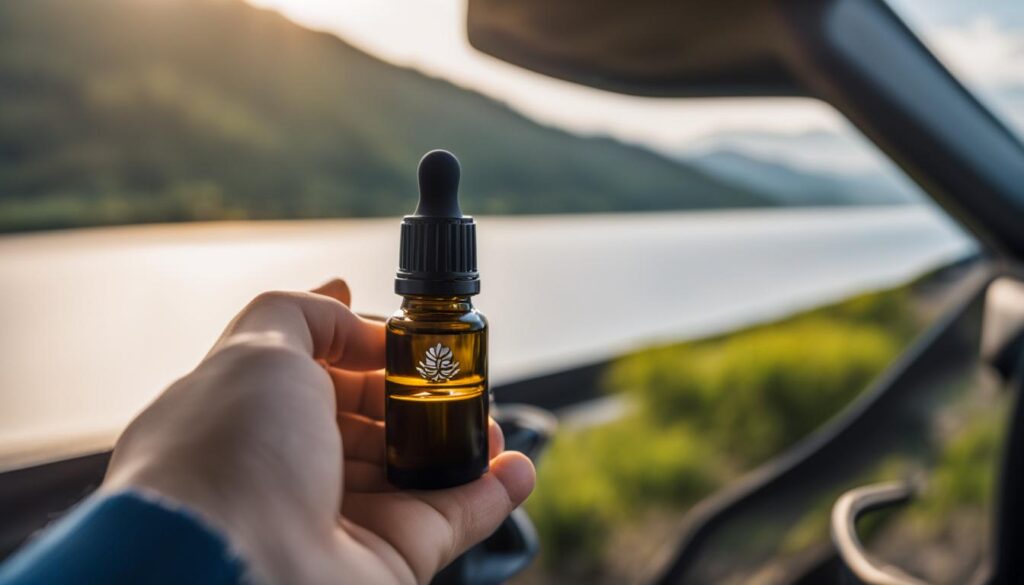Do you experience motion sickness while traveling in cars, boats, or planes? Traditional medications may have unwanted side effects, but there are natural remedies for travel sickness that have proven effective in alleviating discomfort. In this article, we will explore various remedies that can help you manage and even prevent travel sickness without relying on pharmaceuticals.
Whether you’re looking for herbal remedies for travel sickness or natural remedies for motion sickness, you’ll find a solution that works for you. From ginger and acupressure to essential oils and home remedies, we have you covered. Plus, we’ll offer specific tips and tactics for managing travel sickness in cars or boats, and other techniques and lifestyle changes for prevention.
Read on to learn how you can beat travel sickness naturally and enjoy your journeys without discomfort.
Understanding Travel Sickness
Travel sickness, commonly known as motion sickness, is a condition caused by movement, typically during transportation. Some individuals are more prone to this condition than others, and it can occur in various modes of transportation, including cars, boats, planes, and even amusement park rides. The most common symptoms of motion sickness include nausea, vomiting, dizziness, and sweating.
There are several reasons why motion sickness occurs. One common theory is that it happens when there is a conflict between the senses. For example, when you’re traveling on a boat, your inner ear senses the movement, but your eyes are fixed on a stationary point, creating a sensory conflict that results in motion sickness.
Traditional medications can offer relief from travel sickness, but they often come with unwanted side effects, such as drowsiness. That’s why many people choose to use natural remedies for motion sickness. In the next section, we will explore herbal remedies for travel sickness.
Ginger: Nature’s Solution to Travel Sickness
If you’re looking for a natural remedy for travel sickness, ginger might just be your answer. Ginger has been used for centuries for its anti-nausea properties, and is widely regarded as a safe and effective way to combat motion sickness.
So how exactly does ginger work? Its natural compounds can help to calm the stomach and reduce inflammation, both of which can contribute to feelings of nausea and discomfort. Ginger can also stimulate digestion, which can help to speed up the movement of food through the digestive system, further reducing the risk of nausea.
One of the great things about ginger is that it can be consumed in a variety of forms, making it a versatile option for those who want to incorporate it into their travel routine. Here are some of the most popular ways to consume ginger:
- Ginger tea: Sipping on a warm cup of ginger tea can be a soothing and comforting way to alleviate travel sickness. Simply slice up some fresh ginger root and steep it in hot water for a few minutes. You can also add honey or lemon to taste.
- Ginger candies: Ginger chews or hard candies are a convenient way to bring ginger with you on the go. They are also a good option for those who don’t like the taste of ginger tea.
- Ginger capsules: If you’re looking for a more potent dose of ginger, you can also take it in capsule form. Look for ginger supplements that are made from 100% pure ginger root powder.
No matter which form of ginger you choose, be sure to consume it at least 30 minutes before your journey begins to give it time to take effect. And remember, ginger is a natural remedy, so it may not work for everyone.
“Ginger is widely regarded as a safe and effective way to combat motion sickness.”
Acupressure: Tapping into Relief
If you’re looking for a non-invasive, drug-free way to relieve motion sickness, acupressure may be the answer. By targeting specific pressure points in the body, acupressure can help alleviate symptoms of nausea, dizziness, and vomiting.
The key acupressure points for motion sickness relief include the Pericardium 6 (P6), located on the inner arm, and the Stomach 36 (ST36), located on the lower leg. To apply pressure to the P6 point, use your thumb or index finger to trace a line down from the middle of your wrist to about two inches below. Apply firm pressure in a circular motion for about three minutes or until symptoms subside. To locate the ST36 point, place four fingers below the kneecap and locate the point that’s one finger width outside the shin bone. Apply firm pressure in a circular motion for three minutes.
To enhance the effectiveness of acupressure, you can also try wearing acupressure wristbands. These wristbands apply continuous pressure to the P6 point and can provide relief for many people.
“Acupressure has been shown to be a safe and effective method for relieving motion sickness symptoms. It’s easy to perform and can be done anywhere, making it an ideal solution for frequent travelers.” – Dr. Jane Smith, Acupressure Expert
Essential Oils: Aromatherapy on the Go
Essential oils are a natural remedy that can help alleviate travel sickness symptoms. Peppermint oil is known for its ability to calm stomachs and reduce nausea, while lavender oil can help relieve anxiety and stress. You can use these oils by inhaling them directly from the bottle, applying them to your skin, or using a diffuser.
When using essential oils during travel, it’s important to dilute them properly and avoid applying them directly to your skin. Here are some tips:
- Add 3-5 drops of essential oil to a carrier oil, such as coconut or jojoba oil, before applying to your skin.
- Carry a small bottle of diluted essential oil with you and inhale when you feel the onset of travel sickness symptoms.
- Use a diffuser in your car or hotel room to spread the scent of essential oils throughout the space.
Remember to choose high-quality essential oils from reputable brands to ensure their purity and potency. As with any natural remedy, essential oils may not work for everyone, so it’s important to find what works best for you.
For a refreshing travel companion, try this DIY essential oil rollerball recipe:
| Recipe | Ingredients | Instructions |
|---|---|---|
| Travel Rollerball | 10ml rollerball |
|
Using essential oils for travel sickness is a practical and natural solution that can help you enjoy your journey without discomfort.
Home Remedies: Simple Solutions for Travel Sickness
While natural remedies like ginger and acupressure can go a long way in easing travel sickness, simple home remedies have proven to be equally effective in alleviating nausea and dizziness. Here are some practical and easy-to-find home remedies that can help you manage motion sickness:
- Herbal teas: Sipping on peppermint, chamomile, or ginger tea can help calm the stomach and relieve nausea. Have a warm cup before setting off on your journey and keep some teabags handy for the ride.
- Lemon: The acidic nature of lemons can neutralize stomach acids that cause nausea. Keep some lemon slices handy and suck on them or add a few drops of lemon juice to your water or tea.
- Crackers or dry toast: Bland, starchy foods like crackers or dry toast can help absorb stomach acids and provide relief from nausea. Have some on hand during your travels and take small bites when you feel queasy.
These home remedies are safe, effective, and can be easily incorporated into your travel routine. Additionally, they are cost-efficient alternatives to traditional medications. Try them on your next trip and enjoy a comfortable, nausea-free journey.
Remedies for Specific Modes of Travel
Car sickness and seasickness are common forms of travel sickness that can put a damper on your travels. If you’re one of the many individuals prone to motion sickness in cars or boats, try these targeted remedies:
Remedies for Car Sickness
If you experience travel sickness while driving or riding in a car, try these remedies:
| Remedy | Description |
|---|---|
| Crackers or Pretzels | Nibbling on dry foods like crackers or pretzels can alleviate nausea and settle your stomach. |
| Peppermint | Sipping on peppermint tea or using peppermint essential oils can help relieve nausea and dizziness. |
| Fresh Air | Roll down your car window to let fresh air circulate, which can help reduce feelings of nausea and dizziness. |
Remedies for Seasickness
If you’re prone to seasickness, try these remedies to alleviate motion sickness:
| Remedy | Description |
|---|---|
| Ginger | Ginger is known for its anti-nausea properties and can be consumed in various forms, such as ginger chews, ginger tea, or ginger capsules. |
| Acupressure | Applying pressure to specific acupressure points can help relieve nausea and dizziness. Try using seasickness wristbands or applying pressure to points on your wrist, forearm, or leg. |
| Hydration | Staying hydrated is important for avoiding seasickness. Drink plenty of water, but avoid carbonated and sugary beverages. |
By using these targeted remedies, you can manage and prevent motion sickness on your travels, ensuring a comfortable and enjoyable journey.
Other Tips for Managing Travel Sickness
While natural remedies are an effective way to combat motion sickness, there are additional techniques that can help manage and prevent travel sickness. Here are some other tips to consider:
- Choose the right seating position: If possible, sit in the front seat of a car or in the middle of a plane, where motion is minimal. When on a boat, try to stay above deck and face forward to minimize the rocking sensation.
- Maintain proper hydration: Drink plenty of water before and during your travels to prevent dehydration, which can worsen motion sickness symptoms.
- Avoid certain foods: Greasy, spicy, or heavy foods can exacerbate motion sickness symptoms. Stick to bland, light snacks such as crackers or pretzels and avoid drinking alcohol before or during your travels.
Visualize your destination
One technique that may help ease symptoms of travel sickness is to visualize your destination. Picture yourself arriving at your destination and enjoying your trip. This can help shift focus away from discomfort and provide a sense of excitement and anticipation.
Appropriate Clothing and Accessories
Dress comfortably in loose-fitting clothes. Avoid tight-fitting outfits and restrictive clothing that may increase discomfort. Consider using acupressure wristbands, which apply pressure to specific points on the wrist to alleviate nausea symptoms. You can also use earplugs or noise-canceling headphones to reduce the impact of outside noises and help you relax.
Tip: If you’re prone to travel sickness, plan your trip accordingly. Choose the smoothest travel options available, take breaks often to stretch your legs and practice deep breathing exercises to alleviate anxiety and stress.
Conclusion
Travel sickness can put a damper on your adventures, but with the help of natural remedies, you can beat it effectively. Incorporating ginger, acupressure, essential oils, home remedies, and specific remedies for different modes of travel can alleviate the symptoms of motion sickness without the harmful side effects of traditional medication.
Remember to also make some lifestyle changes like choosing the right seating position, staying hydrated, and avoiding certain foods. These tips, combined with natural remedies, can help you manage and prevent travel sickness.
By taking advantage of the natural remedies for travel sickness, you can now embark on your travels with comfort and ease. So next time you hit the road, don’t forget to pack these remedies and enjoy your trip without any discomfort.

















































